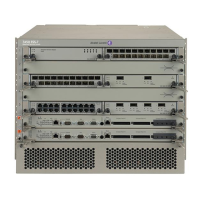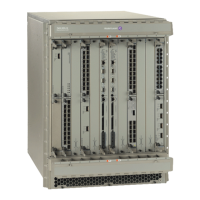Hybrid OpenFlow Switch
Router Configuration Guide 659
To enable multi-service mode of operation, an operator must embed the OF switch in an ACL
filter policy, and, since multi-service H-OFS supports a mix of VPRN/VPLS/GRT/System
rules, an additional scope of embedding must be selected (embed open-flow service, embed
open-flow system - grt scope used by default). Since after embedding H-OFS instance, an
ACL policy contains rules specific to a particular VPRN or VPLS service instance or to a
GRT or to a System Filter Policy, the ACL filter policy can only be used in the scope defined
by H-OFS embedding.
Rules programmed by an OF controller with grt, system, and service cookies specified are
accepted even if the H-OFS instance is not embedded by a filter activated in a given context.
Rules programmed by an OF controller with a service cookie specified, when the service ID
is not one of the supported service types, or when the service with the specified id does not
exist, are rejected with an error returned back to the controller. If an H-OFS is embedded into
a line card policy with a specific service context, the embedding must be removed before that
service is deleted.
Table 66 summarizes the main differences between the two modes of operation.
Table 65: Multi-Service Mode — Higher Order Bit Flow Table Cookie Encoding
sros-cookie Name sros-cookie Type
(Bits 63...60)
sros-cookie Value
(Bits 59...32)
FlowTable Entry Interpretation Based
on the sros-cookie
grt 0000 0 FlowTable rule is applicable to GRT
instance (IES and router interfaces)
system 1000 0 FlowTable rule is applicable to system
filters
service 1100 service-id for
existing VPLS or
VPRN service
FlowTable rule is applicable to an existing
VPRN or VPLS service specified by the
sros-cookie value
Table 66: Differences Between GRT Mode and Multi-service Mode
Function GRT Mode
(no switch-defined-cookie)
Multi-service Mode
(switch-defined-cookie)
Support OF on IES access interfaces Yes Yes
Support OF on router interfaces in GRT
instance
Yes Yes
Support OF on VPRN access and
network interfaces
No (lack of native OF service
virtualization)
Yes
